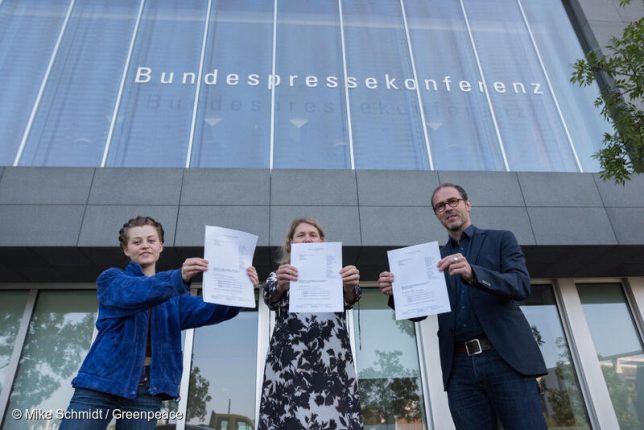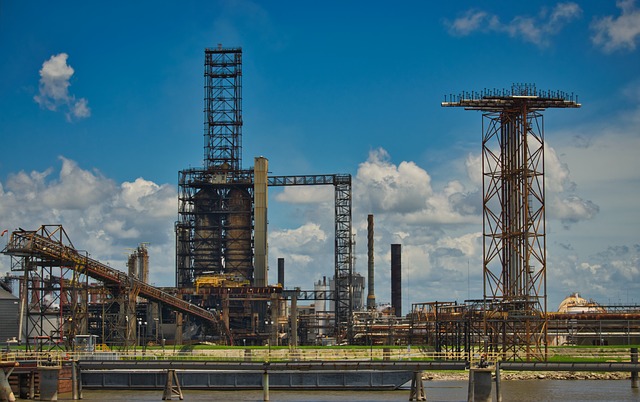“While people suffer from floods and droughts triggered by the climate crisis, the car industry, despite its enormous contribution to global warming, seems unaffected.”

Deutsche Umwelthilfe (DUH) and Greenpeace today announced lawsuits against German corporations for failing to protect the climate. They are legally demanding that Volkswagen, BMW and Mercedes significantly accelerate the climate-friendly conversion of their companies: By 2030, the three German automakers are to stop building climate-damaging internal combustion vehicles worldwide, and the oil and natural gas company Wintershall Dea must stop developing new oil and gas fields from 2026. For the first time since the landmark climate ruling of the Federal Constitutional Court, environmental associations are taking legal action against climate-damaging corporations, Greenpeace against VW, DUH against BMW, Mercedes and Wintershall Dea. The plaintiffs include the executives of the associations and the Fridays for Future activist Clara Mayer.
In this picture: Plantiff Clara Mayer, Attorney Dr. Roda Verheyen, Executive Director Greenpeace Martin Kaiser.
© Mike Schmidt / Greenpeace, 3 Sep, 2021
By Jessica Corbett, Common Dreams (CC BY-ND 3.0).
A pair of climate advocacy groups on Friday announced lawsuits against BMW, Mercedes-Benz, and Volkswagen for fueling the climate emergency, hoping to force the German carmakers to stop selling internal combustion vehicles and cut their carbon footprints 65% by 2030.
“With our lawsuits, we want to achieve the exit from the internal combustion engine.”
—Barbara Metz, DUH
Greenpeace Germany and Deutsche Umwelthilfe (DUH) are accusing the companies of failing to decarbonize in line with the 1.5°C temperature goal of the 2015 Paris climate agreement.
The groups addressed the legal actions during a Friday press conference, with Greenpeace targeting Volkswagen and DUH initiating proceedings against the other two carmakers as well as the fossil fuel company Wintershall Dea, aiming to prevent it from developing new oil and gas fields by 2026.
“While people suffer from floods and droughts triggered by the climate crisis, the car industry, despite its enormous contribution to global warming, seems unaffected,” said Martin Kaiser, executive director of Greenpeace Germany, in a statement.
An April 2021 ruling on climate action from Germany’s highest court “represents a mandate to quickly and effectively enforce the legal protection of our common livelihoods,” Kaiser added. “We need all hands on deck to protect our common future.”
As German broadcaster Deutsche Welle detailed:
Two lawyers—Remo Klinger and Roda Verheyen—who helped environmental activists force the German government to commit to more detailed plans of how it will reduce carbon emissions to near zero by 2050 will also represent the plaintiffs in this case, DUH said.
Following the success of the case against the government, the NGOs are hoping to pursue the precedent set by Germany’s Federal Constitution Court (BverfG) and uphold the rights of future generations.
“The BVerfG concluded in its groundbreaking climate decision that future generations have a basic right to climate protection. Large corporations are also bound by this!” the DUH said in a tweet.
Verheyen said Friday that “whoever delays climate protection harms others and thus behaves unlawfully. This is clear on the basis of the constitutional court decision, and this also and especially applies to the German car industry with its gigantic global CO2 footprint.”
“Clearly, this is not a game,” the attorney added. “Civil law can and must help us to prevent the worst effects of climate change by ordering corporations to stop emitting—otherwise they endanger our lives and deprive our children and grandchildren of the right to a safe future.”
Greenpeace Germany is suing #Volkswagen.@VW is making huge profits by producing climate-damaging cars, which we will have to pay dearly for in the form of climate consequences.
— Greenpeace (@Greenpeace) September 3, 2021
It is time to hold Volkswagen legally responsible.#ClimateEmergency
Among the plaintiffs in the Volkswagen case is Clara Mayer of the youth climate movement Fridays for Future. Mayer declared that “climate protection is a constitutional right.”
“It is not acceptable that a company should so significantly prevent us from reaching our climate targets,” she continued. “At the moment, Volkswagen is making huge profits by producing climate-damaging cars, which we will have to pay dearly for in the form of climate consequences. The basic rights of future generations are in danger, as we are already seeing the effects of the climate crisis. The begging and pleading has come to an end, it is time to hold Volkswagen legally responsible.”
Volkswagen, Mercedes-Benz, and BMW “have previously announced plans to transition to producing more eco-friendly electric cars,” DW noted, “but environmentalists have said these plans are vague and nonbinding.”
The outlet also reported on carmakers’ responses to the new cases against them:
Daimler, the maker of the Mercedes-Benz brand, said it saw “no basis” for the legal action against them and that it would defend itself “through all legal means.”
BMW said in response to the announcement that it was already committed to the Paris climate agreement. Volkswagen, which owns several car brands including Audi, Porsche, and Skoda, did not comment.
Meanwhile, those behind the lawsuits warned that their actions are intended to help ensure a habitable future planet.
“It’s about the future of our children when we complain today about an end to the production of combustion cars from 2030 onwards,” said Barbara Metz, deputy federal manager of DUH.
“Like hardly any other company, BMW has blocked the exit from the internal combustion engine and a credible switch to economical, battery-electric cars,” Metz said. “While we are feeling the consequences of the climate crisis more and more clearly, BMW is constantly developing new combustion SUVs and sedans. With our lawsuits, we want to achieve the exit from the internal combustion engine that is necessary at BMW.”
Greenpeace and DUH’s moves come just before the Automobil-Ausstellung (IAA), one of the world’s largest car shows, is set to open on September 7 in Munich. German climate campaigners are planning a large march and bike ride to protest the event.


